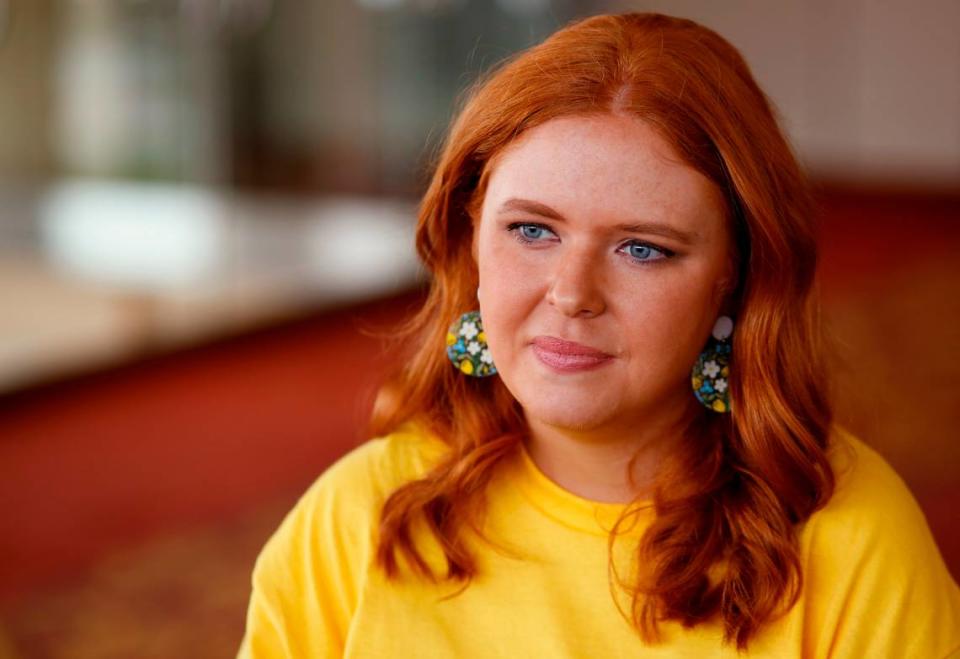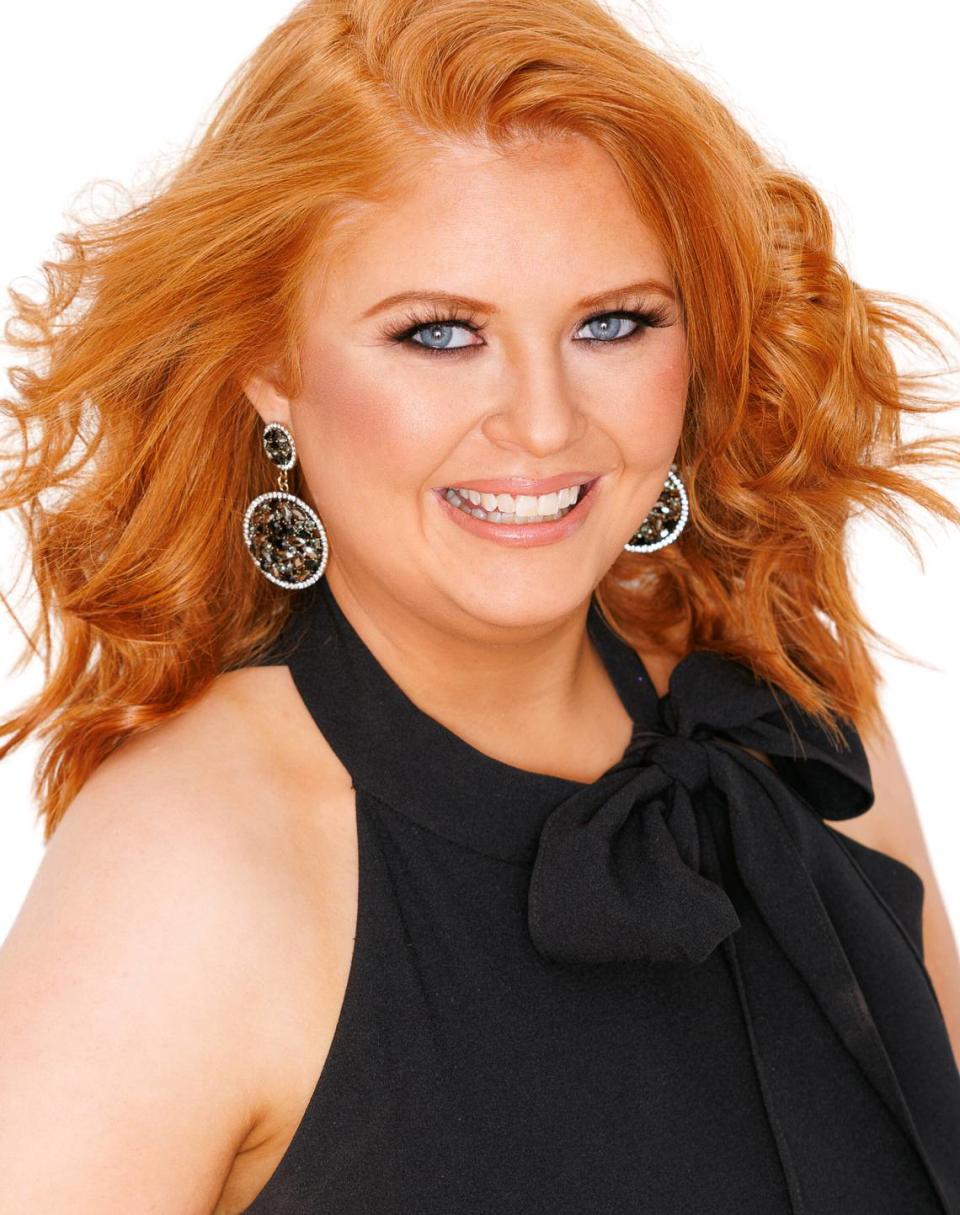‘I felt alone.’ How one Miss Georgia contestant survived assault, homelessness & rape
Her sexual assault led to being homeless, and her victimization led to being raped — and her recovery led to qualifying for the Miss Georgia Scholarship Competition, where she shares her survivor journey’s lessons.
That’s the resilient story Miss Hogansville 2023 Abby Callaway tells. So when she appears on stage this week at the RiverCenter for the Performing Arts in Columbus to vie for the state crown, she will feel like she already has won.
“I can prove that I’m worthy of this,” she told the Ledger-Enquirer. “I belong here, and I’m part of this family.”
This week’s preliminary rounds for the 78th annual Miss Georgia Scholarship Competition start each night at 7 p.m., followed by the finals Saturday at 8 p.m., when Miss Georgia 2023 and Miss Georgia’s Outstanding Teen 2023 will be crowned.
Tickets are sold online at rivercenter.org and at the RiverCenter box office, 706-256-3612.
This year’s event has 92 contestants (56 for Miss Georgia and 26 for Miss Georgia’s Outstanding Teen) who won local pageants to qualify for the state competitions, which will award $75,000 in scholarships. The winners will represent Georgia in the Miss America and Miss America’s Outstanding Teen competitions.
‘A whirlwind’
Callaway, 25, graduated in 2015 from Social Circle High School in Walton County, Georgia. She enjoyed her freshman year as a music therapy major at UGA. Then, away from campus, she was sexually assaulted in August 2016 at the beginning of her sophomore year.
“I had to make the decision: Am I going to allow myself to be safe and happy, or was I going to be stuck in the abuse still,” she said. “I had to make the choice, and then I was financially on my own and by myself without anyone on my side.”
Paying for college and living expenses on her own proved unsustainable. She became food insecure and homeless during the summer of 2017.
“It was just a whirlwind,” she said.

For two months, Callaway slept each night in her car at UGA parking lots.
“I had everything I own in the trunk of my car or stowed away under seats,” she said.
Callaway was too embarrassed to tell her friends about her situation.
“I felt alone — so alone,” she said. “I didn’t have anyone I could turn to. … I knew if I could hold on just a little bit longer, I knew there had to be good in the world. … So, when it came to sink or swim, I decided to swim.”
Callaway sometimes made up a reason to ask friends if she could use their shower. But she went as long as two or three weeks without shower, so she used baby wipes and extra deodorant instead. She also used baby wipes to clean the one spoon she had to eat her go-to meal at the time, a can of SpaghettiOs.
“I thought everything that was happening to me was my fault,” she said. “I thought this was justice and what was deserved for me. Thankfully, I now know that wasn’t my fault at all, and I didn’t deserve any of that.”
Callaway figured out a way to work three part-time jobs while still attending college classes to afford an apartment. But the expenses mounted, and she dropped out of college as a senior in 2018 because she vowed to never sleep in her car again.
“It was between choosing a roof over my head and paying my tuition,” she said.
Revictimized
Studies show sexual crime victims are at increased risk for being revictimized. That’s what happened to Callaway, raped in 2018 by a fellow student on the UGA campus.
“Perpetrators pick their targets well,” she said, “and (hers) knew that was an experience I had.”
One of her part-time jobs was working at the front desk for a program that supports students who were foster children or homeless. Callaway felt too scared to seek help, but her supervisor sensed she was hiding a problem and asked her to fess up.
“Everything came out,” she said. “… I know if she did not ask me that, I don’t know if I would be alive today, I really don’t.”
The supervisor connected her to the UGA dean of students office, which gave her resources and support to pay rent for an apartment.
“Everybody swooped in,” she said. “I knew then I didn’t have to be a statistic. I could rise above it.”
Callaway spoke to the police about her sexual assault and rape, she said, but the perpetrators weren’t prosecuted.
“Both investigations were dropped,” she said.
But she isn’t dropping the issue.
“That’s why I’m here to compete for Miss Georgia, to be an example that you can come forward and speak about this, and there’s nothing to be ashamed of,” she said. “There are so many free resources, especially in the state of Georgia, to support survivors so that they can get back on their feet.”
Road to Miss Georgia stage
Callaway felt fortunate to have a rape crisis center available in Athens that connected her to resources, such as paying for more than two years of psychological therapy.
“I was able to go through support groups and just really have the second chance at life almost,” she said, “because if I didn’t have that, I honestly don’t think I would be alive today. Something horrible would have happened or my mental health would have spiraled.”
One day, her therapist challenged her to try something different, something she always wanted to do but never did. Callaway discussed her options with a friend, who had just competed in a pageant and told her, “If you don’t know who you are, you’re going to get in a judges interview, and that’s going to force you to figure out who you are.”
So she entered a local pageant in 2021. She didn’t win anything, but she enjoyed the experience. Callaway thought her pageant career would be one-and-done, but it was a beginning instead of an end.
“I felt so heard and loved by the Miss Georgia community that I knew I had to keep going,” she said. “… They say, ‘Your story does matter, and it’s valid, and you’re not alone anymore.’”

Later that year, Callaway entered her first Miss Georgia preliminary. Again, she didn’t win, but after the competition, Miss Georgia 2021 Karson Pennington told her, “You belong here, and your story is powerful.”
Callaway recalled, “Having those small interactions with people kept validating and affirming.”
So she kept competing in pageants and won the 2022 Miss Crossroads of the South title in Swainsboro to qualify for that year’s Miss Georgia contest, where she won the Together for Mental Health award for the Sunflowers Against Sexual Assault organization she created.
Sunflowers Against Sexual Assault
The reference to sunflowers, which are considered nature’s strongest flower, is a metaphor for surviving and then thriving after sexual assault: Sunflowers turn to face the sun, and still stand tall and bloom even in a drought.
“Every time I saw a sunflower,” she said, “it gave me a little bit of hope.”
Now, she spreads that message. During the past six months, she has spent more than 350 hours on crisis hotlines, advising sexual assault survivors and helping them get the care and support they need.
Callaway helped raise nearly $30,000 this year for rape crisis centers. She also has partnered with 19 centers to help train counselors by sharing her survivor story with them.
In April 2022, Callaway was the keynote speaker for a sexual assault awareness event in northwest Georgia. While she was helping to clean up, a 15-year-old girl asked to get a picture with her. She hugged Callaway and whispered, “I didn’t know there was anyone like me.”
Callaway recalled, “I just held her in that moment, and she sobbed in my arms.”
Taking advantage of the moment, Callaway helped her get the support she needed.
“She’s in a safe environment where she isn’t abused anymore,” Callaway said.
The $3,600 in scholarships Callaway has won through the Miss America Organization enabled her to return to college, this time online with Oregon State University for a bachelor’s degree in public health while living in Atlanta and working as a nanny. Callaway wants to return to UGA for a master’s degree, work in a rape crisis center and research what she calls the epidemiology of sexual violence.
“That way we can track and go backwards and say, ‘This happened. Why did this perpetrator do this? What happened to him? How could we stop that?’ . . . The recovery from that and being able to rise above it is what’s made me the person I am today,” she said.
Callaway paused, then clarified that statement.
“I didn’t become a better person by being raped,” she said. “I became a better person because so many people loved me and poured into me and showed me grace when I was at my messiest and helped me redeem myself and gave me the opportunity to reclaim my life.”
Callaway wants more education for protective measures, such as bullying prevention, mentorships and empowerment programs for children, so they don’t become perpetrators. She also wants more opportunities to teach people when they are victims or witnesses of sexual violence to speak up and seek help through appropriate resources.
“We can be doing so much more,” she said.
One American is sexually assaulted an average of every 68 seconds, but only 25 out of every 1,000 perpetrators will end up in prison, according to Rape, Abuse and Incest National Network.
Just a few years ago, Callaway couldn’t envision herself as a contender for the Miss Georgia or Miss America title. Now, she said, “I can see myself in those roles, working with kids, working in community centers and talking about why sexual violence is something that we can prevent and should be preventing.”

